6+ Sample Pre-Production Plan
-
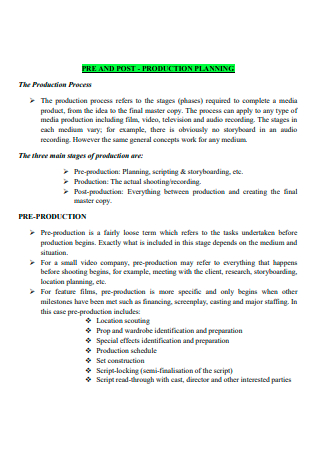
Pre and Post Production Plan
download now -
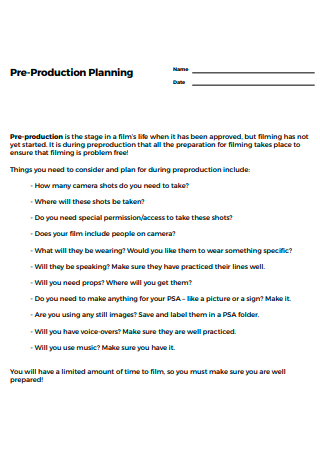
Basic Pre-Production Planning
download now -
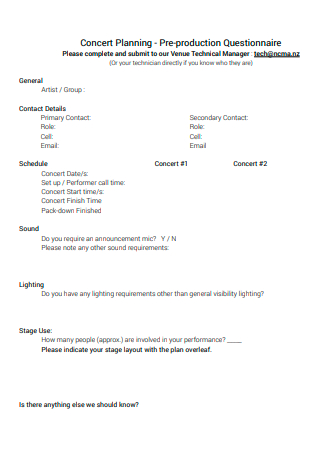
Pre-Production Plan Questionnaire Planning
download now -
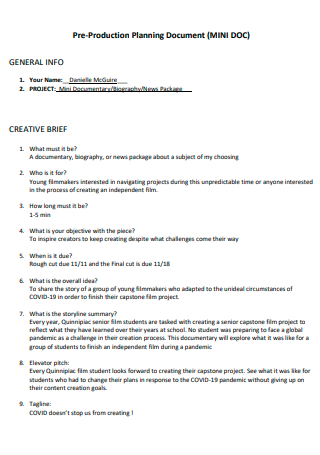
Pre-Production Planning Document
download now -
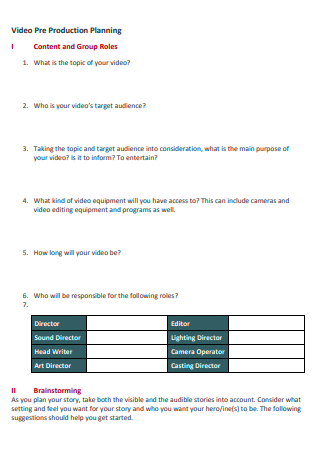
Video Pre-Production Planning
download now -
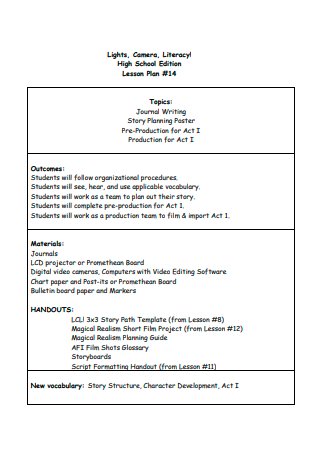
Pre-Production Lesson Plan
download now -
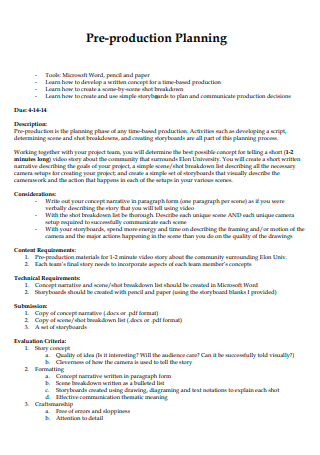
Pre-Production Planning in PDF
download now
FREE Pre-Production Plan s to Download
6+ Sample Pre-Production Plan
What Is a Pre-production Plan?
How to Make a Pre-production Plan
Essential Elements of Pre-Production
FAQs
What is the importance of pre-production in filmmaking?
When does pre-production end?
What happens without pre-production planning?
What Is a Pre-production Plan?
Pre-production planning involves determining what you will need to produce your film, how much it will cost, and who you will be able to recruit to assist you. The director, cinematographer, producers, first assistant director, Project Managers, production coordinators, and site scouts are frequently involved once the script is finalized. Each project is unique, based on the budget and scope of the production, but there are some general criteria to keep in mind. These plans are essential to make sure no relevant detail is forgotten before proceeding to the next stage of production. Check out an example of pre-production plans to see how they are structured.
How to Make a Pre-production Plan
Pre-production planning for video, film, and Multimedia won’t be easy without a thorough document to be shared with other roles of the crew. This entails that if you don’t bring your concepts or ideas into a physical document, the other members of the crew may have difficulty envisioning what you have in mind. This is why a pre-production plan will come in handy to make sure that your message is received and understood by others who will be working with you to produce a film, music, or other forms of art. Take a look at the available pre-production plan examples this article provides.
-
Step 1: Write Your Executive Summary
The pre-production plan’s main points should be summarized in an Executive Summary. It should restate the project’s goal, emphasize the most important elements, and summarize any relevant details, conclusions, or recommendations made in the project. Even though this can run from two to four pages long or depending on your contents, the details should still not be lengthy and confusing to whoever would be reading the contents. Since the main purpose of the executive summary is to encapsulate the main points, producers who are in a rush can get the gist of your project by reading this section of your plan.
-
Step 2: Candidly Give Your Objectives
The next step would require you to thoroughly state the goals and objectives that your project would want to achieve. This includes knowing what do you want to accomplish through the process of the pre-production stage, the reasons for achieving the goal, as well as the rewards of doing so, etc. Alternatively, you can also utilize the SMART Goals to have a guide on your respective objectives and they have their specific structure. Take your time in this section because you should be able to identify your objectives and goals before proceeding to other steps.
-
Step 3: Add the Operational Plan
An operation plan is a very detailed strategy that outlines how a team or department contributes to the project’s overall objectives. It lays out the day-to-day responsibilities of running the Project. When correctly prepared, an operational plan ensures that each management and employee are aware of their unique responsibilities as well as how they should be carried out within a certain timeframe. It’s critical to plan out the day-to-day chores that will provide a clear route to your project and operational objectives. Your operations plan should address essential topics such as the strategies and tasks that must be completed, the persons responsible, the timelines for completing each strategy, and the cost of doing so.
-
Step 4: Elaborate on the Team
No project can be accomplished with a single individual solely carrying all the tasks by themselves. If you are the director, then you are not expected to create the entire script, find appropriate locations or tailor to the costume to be worn on set. Especially for a large and major project, you will be stressed out handling numerous tasks all at once. This may be expected for an independent film. Nevertheless, if your budget allows it and if the producer demands it, assigning roles and responsibilities is vital to disseminate the tasks necessary to complete a project with ease.
-
Step 5: Elaborate on Your Action Plan
Reaching this last and final step will mean you have completed all the prior steps. It is important that you do since each Objective will have a designated action plan. And a more specific action plan is advisable. Each respective action should also have a designation to one of the team members and an estimated end date. An example of this is for scouting locations, you can assign one of the crew to have a list of areas appropriate for the film by a specific date or the costume department to have their sketches ready for the concept of the outfits that the cast would be wearing.
Essential Elements of Pre-Production
On a movie set, the first day of shooting is never the first day of production. Days, weeks, months, years, or decades might pass between the commencement of a film’s development and when the cameras begin rolling. A movie’s production and post-production processes might be shorter, longer, or about the same, but neither can exist without pre-production, the effort that goes into a film before any pictures are captured. The following stages or elements will be relevant to keep in mind to ensure a steady process and smooth Video Production workflow. The items in this curated list will act as a checklist for you to keep track of the necessary things that should not be forgotten while planning during the pre-production process.
FAQs
What is the importance of pre-production in filmmaking?
Before you start rolling the cameras, you may organize everything you need during the pre-production phase of filmmaking. Pre-production is the process of arranging and carrying out all of the tasks that must be completed before production can begin. When it comes to filmmaking, effective pre-production may help you save time and money which are the two most scarce resources. You are less likely to misuse resources or run out of money if you have a Budget in place. Detailing the timeline is also important for a smooth production process since it offers the team a clear picture of how much time they need allot for an effective shot.
When does pre-production end?
The cameras are now ready to roll when this stage is completed. You have cast your actors, obtained site permissions, recruited the crew, and made arrangements for equipment rentals. Pre-production is an important part of every project since it ensures that the actual production runs well. Make sure that before you or your producer gives the acknowledgment that pre-production has been completed, no other relevant detail essential for the Film has been forgotten. Otherwise, you will need to go back to planning it and could stall the production stage.
What happens without pre-production planning?
The entire production is built on the foundation of pre-production planning. Without pre-production, locations for filming would not have been reserved, shot lists have not been established, and talent has not been recruited. If you mess up pre-production, your team won’t be as prepared to execute their optimum effort or make speedy modifications when problems arise on set. Modifications done in the long run would instead lengthen the production and post-production time which could delay the film further than intended. This could lead to a loss of resources and money, which would not please the producers or film crew.
Pre-production video planning may seem tiring to go through and might tempt you to jump right into starting a production. But without finishing the script, creating a storyboard, contacting locations, and securing permits, your project may encounter issues that could compromise the flow of the production. This would end up with you facing more stress and hassle than preparing it from the beginning. This is why creating a pre-production plan is essential to ensure that your production and post-production stages are smooth and without any unnecessary bumps. What are you waiting for? Start making that pre-production plan now!
